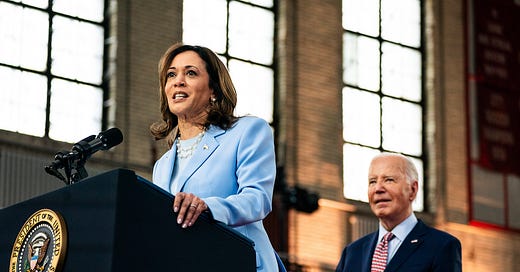No, We Should Not Have a Brokered Convention
A free-for-all to succeed Biden sounds good in theory. Here's why it's probably a bad idea.
How crazy is the crisis in the Democratic Party right now? Crazy enough that Discourse Blog co-founder and eternal comrade Paul Blest dusted off his blogging shoes and filed his first dispatch with us in over two years. If this is what it took to get Paul to blog again…we thank you, Joe Biden! OK, here’s Paul.
Joe Biden is done. You can see it in the eyes and hear it in the voice of every Democratic politician talking about Biden’s catastrophic debate last Thursday, even the ones who are officially members of the campaign. You can see it in panicked donors drumming up money to save the Senate and House with the assumption that the White House is lost. You can especially see it in the early post-debate polls, particularly a leaked one showing Biden not only losing every borderline battleground state but also Virginia and New Mexico and potentially even Maine, Minnesota, and Colorado.
The question now is what happens next. Among the many options: sticking with Biden and risking the kind of massive Republican wave election that polls are showing is increasingly likely; Biden handing over the reins to Vice President Kamala Harris, either directly by resigning or withdrawing from the race and endorsing her to replace him; or Biden withdrawing in favor of a “brokered convention” that would give the power to anoint a new nominee to Democratic National Convention delegates in Chicago in August.
It’s that last option that I want to focus on. In this scenario, the party throws things wide open and conducts the equivalent of a turbo-charged primary election, culminating in the selection of a new candidate at the DNC.
The desire to democratize the process somewhat is understandable, given there was an aggressive effort to neutralize any intraparty threat to Biden (the historically incompetent Florida Democratic Party went as far as to cancel its primary and lost a bunch of local seats to Republicans as a result). There’s also a fear that Harris isn’t ready to lead a national ticket, given her spectacular flameout in the 2020 primary.
The idea of a brokered convention is gaining some traction. CNN reported that Democratic insiders are floating “a five-week speed-dating primary, maybe having debates between now and the convention, and then leaving it up to the convention.” The Intercept’s Ryan Grim wrote that Vice President Kamala Harris, the frontrunner to replace Biden, “has to at least show that she fought for it and won it cleanly. And the only way to do that is at an open convention.”
But if the theory is that opening this up to a convention will ensure the Democrats come out of Chicago with the strongest possible nominee to face Trump — whose unpopularity is second only to Joe Biden — that’s far from guaranteed. What’s more, there are serious risks to a brokered convention — risks that potentially outweigh any benefits the process could bring.
First, let’s talk about money.
Keep reading with a 7-day free trial
Subscribe to Discourse Blog to keep reading this post and get 7 days of free access to the full post archives.





